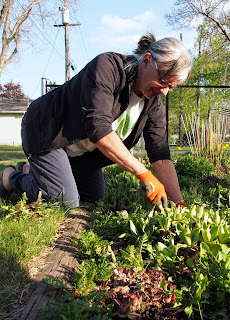At the May meeting, Audrey bemoaned the pests' damage to her lovely martagon lilies and Erica had to sing a requiem for her oriental hybrid. They found these beasties to be fast, flipping and falling on the backs so their dark bellies blended with the dirt.
Here's a reminder of what they look like and what to do from our article last year Pest Alert: Scarlet Lily Beetle:
The Scarlet Lily Beetle has reared its black head (on bright red body) in Edmonton.
At last night's meeting, Margaret brought this to our attention and shared a pamphlet on this voracious pest.
It's here in Edmonton, but hasn't been listed on The City of Edmonton's Pest Management - Insect Identification & Advice site. The City of Calgary, however, has identified it as a common insect pest that is high risk.
Photos from the City of Calgary's site show it at different stage of its life cycle:
Adult lily beetle on lily flower.
Lily beetle larvae on underside of leaf.
Lily beetle eggs on underside of leaf.
Wikipedia indicates there are no natural predators or parasites for the Scarlet Lily Beetle in North America. Until pesticides that are also safe for bees and other insects are developed, crushing the beetle (at all stages) or hand-picking and drowning the adults are perhaps the best choice for population control.
Stay vigilante and may your lilies bloom bright!
For more information and links to other resources visit The City of Calgary's "red lily beetle" site, Lily Leaf Beetle Tracker, and Alberta Regional Lily Society.











